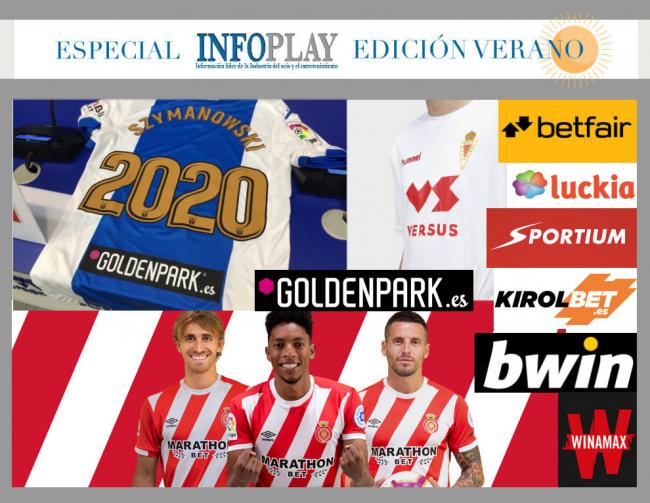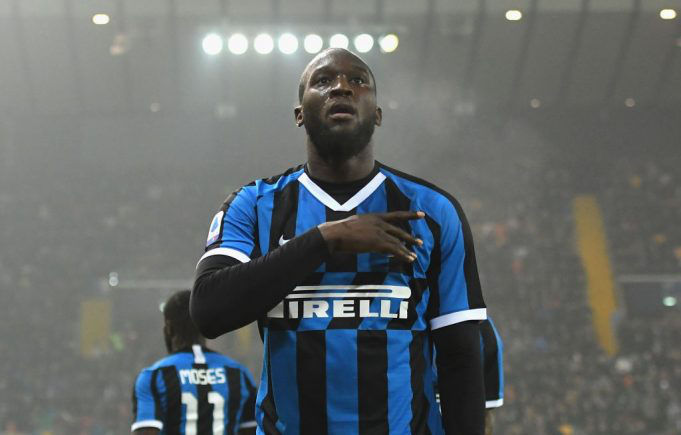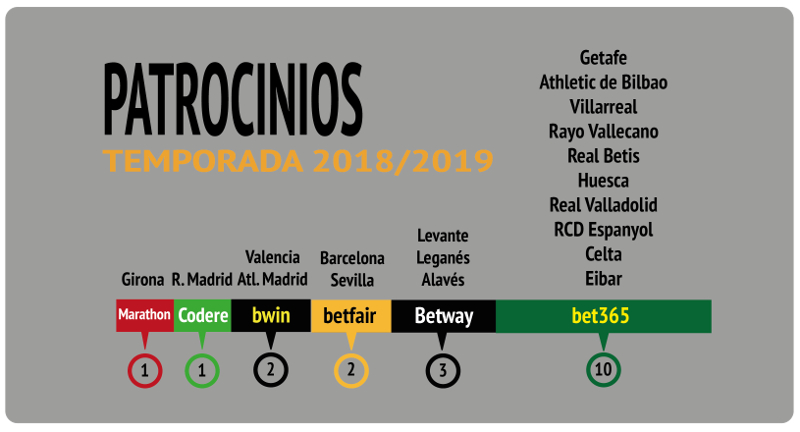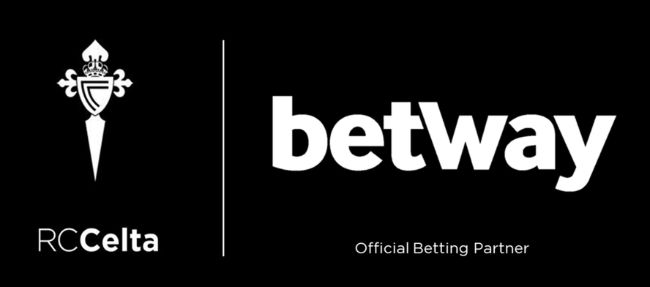After having analyzed what we consider to be a successful case starring Betway in its commitment to sports sponsorship; and also to verify how the British company will start the 2019-2020 season of the Santander League with its logo on the shirts of Real Betis, Celta de Vigo, Deportivo Alavés and Levante UD, we are going to deal with the threats that this and any other Another operator when it comes to trusting a communication and branding channel such as sports sponsorship that the Government has put in the spotlight.
And we will do it through a tour with five sections that we hope will allow us to analyze how the situation is today.
1) Sports sponsorship: wrapped in a new era of change
Since the 1980s, when sponsorships began to be widely allowed in the world of professional football, the companies that monopolized the jerseys of the big clubs were big giants of the industrial sector, with local interests in the club chosen to make themselves known : Ford at Valencia CF, Citroen at Real Celta, Pirelli at FC Inter de Milan or Teka at Real Madrid.
Step by step, as society and the economy opened up towards consumption, the service sector gained ground. Among the emerging segments unknown in the first stage, we find the boom of telephone and telecommunications companies first and providers and leading Internet companies later ... and so, little by little, until reaching a reality like the current one where the sector entertainment in general and travel and tourism in particular is the most present in current sports sponsorships.
Fly Emirates at Real Madrid in Spain, at Hamburg in Germany, at Arsenal in England, at PSG in France and at AC Milan in Italy, is the clearest example of this boom in the services sector, but beyond that. tourism or travel represents the perfect online business model with millions of potential clients and many others who have used its services and are registered users.
In fact, the close example of FC Barcelona is also significant, although it already anticipates the new trend of this class of global companies with potential clients all over the world and in need of having a football club with maximum visibility for their global expansion plans. With 50 million registered users,
Rakuten represents this new advertising colossus and with its sponsorship with FC Barcelona, ??it is able to make a profit that means paying 55 million.
So, first of all, sponsorship activity and investment in sports advertising naturally presents a changing environment. And in the coming seasons, with the boom of the so-called platform economy (Globo, Cabify, BlaBlaCar, Uber ...) a new reality is presented to us, with new actors and new priorities such as what we are beginning to see with agreements such as the who has just signed the French Ligue-1 with Uber Eats, the main sponsor of the top soccer competition in the neighboring country.
2) Sensitive to financial reality and crisis
But if we speak of the sponsorship sector as constantly exposed to change, as is the case with many of the companies that have acted as advertisers, we must also speak of its sensitivity to times of crisis; where investment in advertising of this type is the most exposed to being reduced due -in general- to its high price.
In this year comes Covid-19 and an unprecedented crisis that is logically bound to shake revenue and the number of advertisers due to the ups and downs of the economy. It therefore seems that only the aforementioned giants with a global market vision are eligible for the great patriocines.
In the case of football, a crisis that is accentuated by the uncertainty in the possibility of charging the clubs 100% of the money promised in televised rights due to the threat of suspension of competitions.
The positioning and evolution in this large-scale advertising segment seems complicated and a riskier bet than usual ... with a real possibility - as experienced from the months of March to June - of seeing how the visibility of the brand it disappears with the suspension of sports competitions.
3 - In search of the perfect club: the new way of negotiating sponsorships
But beyond aspects related to the environment - changes in consumption patterns and economic circumstances - making the sponsorship agreements profitable is the great challenge that companies must face. And it is that the difficulty of hitting the right choice of sport, club or the way to reach the target audience is one of the realities that defines the challenge of succeeding in this form of visibility.
Identification with the club being sponsored is something that seemed irrelevant a few years ago - in the days of industrial sponsors - and today the involvement between club and advertiser is absolutely necessary. With the importance of social networks and the need to publicize the brand that is sponsored both to the club's fan base and at a higher level, they make sponsorship a form of communication based on day-to-day life and that should be left in the hands of specialized professionals.
In a world like that of professional sports, with, for example, the ownership of English Premier League clubs -and increasingly in Spain- in the hands of groups of foreign investors from geographical areas such as China, Russia, Taiwan, the United States or In Middle Eastern countries, there are often problematic situations in terms of identification with the sponsor and ownership by fans; something that is perfectly reflected in the Netflix documentary that analyzes the seasons of the north of England team Sunderland FC, in their dramatic descent from the First to the Third division of British football (
Sunderland Till I Die).
Certainly, clubs and sports usually generate an excellent image positioning, but it will also depend -more and more- on the advertised sector and on the way to activate the sponsorship, since the sports consumer is potentially a consumer of endless products, such as we have seen these last years, including gambling and sports betting. The alliance between sports clubs and associations and betting operators has been logical and natural, providing feedback between the two and dealing together quite effectively with associated problems and challenges such as responsible gambling or match fixing.
4 - Fierce Competition
We will talk in detail about this issue in a third article this coming week where we analyze the sectors most benefited from the possible exit of sports bookmakers from sports sponsorships. But in the general context of the difficulty for sports sponsorships to prosper is the constant presence of companies in need of this form of advertising.
We have witnessed in recent years - with sports betting operators occupying a large part of the sponsorships in the major football and basketball leagues - how the change of sponsor for a very similar one is common in just one or two seasons. This is precisely because there are brands that seek to position themselves at all costs after obtaining - for example in this case - obtaining a gaming license.
The same is true among advertisers of financial products such as FOREX and Binary Options. Sports sponsorship represents a gateway to millions of homes, of brands that would hardly reach such a number of potential customers otherwise. Furthermore, sport achieves a legitimacy and recognition that is not found in other uses of marketing and advertising.
A paradigmatic example of this great dynamism, we find it in the series of sponsorships in the two great football clubs of Seville -Real Betis and Sevilla CF- that since the last decade have starred in sports sponsorship of numerous gaming operators: betway, bwin , CIRSA, 888, Platika, Easymarkets and Betway.
5- The next Advertising Decree in Spain
Leaving aside other intrinsic aspects of the sector that must be considered problematic for its harmonious development - we are talking about commissions, the role of agencies and the negotiation processes that dehumanize this form of advertising - it is time to talk about the consequences that it is already having. the imminent arrival this autumn of the Royal Decree on Commercial Communications of Gambling Activity.
The exit clause in contracts between clubs and gambling operators and the fear of being unable to monetize and activate sponsorships -as has happened in Italy- are two strong arguments to consider sponsorship as an extremely risky option in our days at the level legal security.
We know that despite a much more benign first draft, it seems that there will be no exceptions, and the advertising of the bookmakers will be limited to an early morning schedule, so sponsorship on shirts and in stadiums It will not be contemplated in the regulation that will regulate the advertising of the sector. Something that we have already seen in Italy after the publication of the Dignity Decree last year.
Thus, the forecasts on the goodness of the new Gambling Advertising Decree in matters of patriocy are extremely pessimistic. After a first draft version where both sponsorship in sports kits and advertising of gaming brands in stadiums were explicitly contemplated, the latest update presented by him to the European Commission is practically a carbon copy of the Italian model.
And online gambling operators, already accustomed to having to give up the communication platforms that until now gave them the highest audience, already take it for granted that their only way out is advertising at dawn; where almost a dozen operators have reserved spaces to guarantee their visibility either in mini spaces, programs like the current ones in charge of Sportium and Interwetten and many advertisements.
That is why it is surprising that Betway and other operators such as Dafabet have fought for sponsorships on t-shirts. But the logic of an advertising market totally reduced to a minimum and based on night time makes it impossible for operators to find better alternatives.
So at the risk of seeing your agreements canceled, it is good to try; even more so if it fits in the Santander League, where there is still room to have visibility in international markets thanks to technology (for example, with the edited advertising of the advertisements that surround the field, where companies without a license have been promoted in Spain for years assuming that the image is only seen in the countries that are decided, hence the great weight of local sponsorships by market).
18+ | Juegoseguro.es – Jugarbien.es






